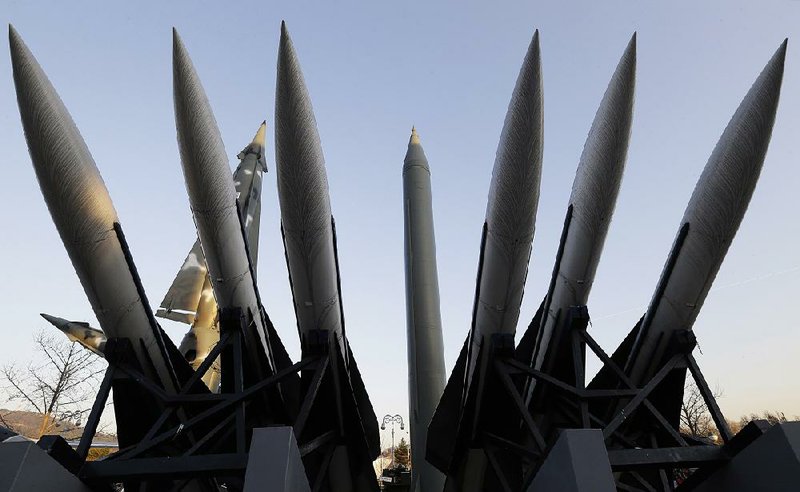SEOUL, South Korea -- South Korea, the U.S. and Japan will sign their first joint intelligence-sharing pact next week to better cope with North Korea's increasing nuclear and missile threats, officials said Friday.
The U.S. has separate, bilateral intelligence-sharing agreements with South Korea and Japan, both U.S. allies which are hosts to tens of thousands of U.S. troops.
But Seoul and Tokyo don't have such bilateral pacts, partly a result of long-running disputes regarding history that stem from Japan's colonial rule of the Korean Peninsula from 1910 to 1945. In 2012, the two almost forged an intelligence-sharing pact, but its signing was scrapped at the last minute after a backlash in South Korea.
Under the latest initiative, South Korea and Japan would share intelligence only on North Korea's nuclear and missile programs via the U.S., according to a statement from Seoul's Defense Ministry.
North Korea said Dec. 20 that it would bolster its nuclear-arms program in response to what it calls U.S.-led condemnation of its human-rights record at the United Nations. North Korea conducted its third atomic test last year and has threatened to attack the U.S. with nuclear missiles.
The pact would enable the three countries to swiftly respond to any North Korean provocation at a time when its threats are growing after a third nuclear test in February 2013, according to the statement. The use of Japanese intelligence assets would boost surveillance on North Korea, it said.
South Korean officials say the North is believed to have made progress in manufacturing nuclear warheads that are small and light enough to be placed on a missile capable of reaching the U.S. North Korea conducted its first bomb test in 2006, followed by another in 2009.
The formal signing of the pact by the South Korean vice defense minister and his U.S. and Japanese counterparts will take place Monday, South Korean defense officials said. Deputy defense ministers in the three nations will sign the agreement remotely in their countries without a formal ceremony.
The Korean Peninsula was divided into a U.S.-backed South Korea and a Soviet-supported, socialist North Korea at the end of the Japanese occupation. The two Koreas fought a three-year war in the early 1950s, which ended with an armistice, not a peace treaty.
In October, troops of the rival Koreas exchanged gunfire along their heavily fortified border twice, though no causalities were reported.
Japanese Prime Minister Shinzo Abe and South Korean President Park Geun-hye have yet to hold a summit as ties remain fractious over historical issues and islands claimed by both nations, known as Takeshima in Japanese and Dokdo in Korean. The accord revives efforts that collapsed two years ago just hours before signing -- a deal that would have also included information on China.
"It's symbolically important," said Robert Dujarric, director of the Institute of Contemporary Asian Studies at Temple University's Japan Campus. "We disagree on history, we disagree on Dokdo, but we can work together and this is a message to North Korea and China."
Information for this article was contributed by Hyung-Jin Kim of The Associated Press and by Sam Kim and Isabel Reynolds of Bloomberg News.
A Section on 12/27/2014

